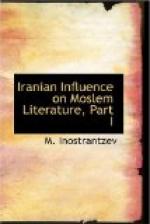I reserve for the Second Part of this book some observations on the Russian language with reference to Orientalism, and Arabic and Persian literatures in particular. Only after the outbreak of the War some interest has been aroused in England in matters Russian generally and a number of grammars and dictionaries and other aids to the study of this most difficult language have recently been placed on the market for the use of students who only a brief three years ago had to depend mainly on German for acquisition of Russian. This neglect of Russian is wholly undeserved. It is doubtful if the researches into Oriental histories and literatures by the Russians have been yet adequately appreciated in England, the tireless efforts of Dr. Pollen and the Anglo-Russian Literary Society notwithstanding. It is apparently still presumed that ripe scholarship in Arabic and Sanskrit is inconceivable except through the medium of the languages of Western Europe. No unworthy disparagement of French labours is at all suggested. But it is only fair to Russia to remember in India that the absence of a Serg d’Oldenberg would leave a lacuna which must be felt in Buddhist Sanskrit; without Tzerbatski the Jain literature both Magadhi and Sanskrit would be appreciably poorer; and that the Continent has produced nothing to exceed the series of Buddhist Sanskrit texts of Petrograd, where was published the still largest Sanskrit lexicon. Naturally in the province of Chinese and Japanese the Russian Academy at Vladivostock stood facile princeps till only the other day its magnificent rival was established in London under the direction of Dr. Denison Ross. An individual scholar like Khanikoff, who like most of his countrymen in the last century preferred to write in French, and a Zukovski has done more signal service to Persian antiquities than could be honestly attributed to many a German name familiar to Indian scholars. The distinguishing feature of the Russian investigator, devoted to the past of Persia, is his uncommon equipment. The Russian bring to their task a mature study of Semitic languages and acquaintance with Avesta philology. Arabic literature teems with allusions to the religions, dogma, customs and the court of Sasanian Iran. Once intended for contemporaries equally at home in the Arabic and Persian idioms these references have




